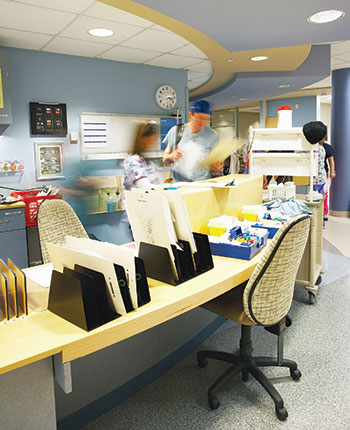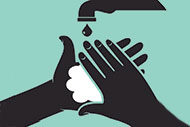 |
| The physical environment indirectly impacts job satisfaction for nurses. Photo by Thomas Northcut |
Architects and interior designers would be smart to keep the needs of nurses in mind the next time they design a new or renovated hospital.
That's because a new study conducted by the Robert Wood Johnson RN Work Project finds that a physical work environment that facilitates efficient teamwork and communication can lead to higher job satisfaction for registered nurses and, therefore, reduced turnover.
The study reveals that while physical environment had no direct influence on job satisfaction, it did have a significant indirect influence, says Maja Djukic, R.N., assistant professor, New York University College of Nursing, New York City, and lead author on the study.
The environment affects whether nurses can complete tasks without interruption, communicate effectively with physicians and other nurses, and do their jobs more efficiently, the study says.
The study did not recommend specific designs, but rather encouraged the use of design to benefit nurse job satisfaction through positive impact on work group cohesion, workload, nurse-physician relations and other factors that can improve communication and efficiency.
Physical environment was assessed on the architectural, ambient and design features of the work space, including ventilation, lighting, arrangement of furniture, colors and decorations, aesthetic appearance and the perceived need for remodeling.
"Clearly, the physical work environment can affect nurses' ability to do their jobs effectively and efficiently," Djukic says. "When investing in facilities' construction or remodeling, health care leaders should look at features that enhance work group cohesion, nurse-physician relations and other factors that affect job satisfaction."
Job satisfaction for RNs is critical for several reasons. It is an important predictor of job turnover, which is 18 percent for nurses after one year of working at a hospital and 15 percent for those with two years' experience, according to a previous study on job satisfaction. Turnover costs employers an estimated $728 million annually.
In addition, because the Centers for Medicare & Medicaid Services can cut reimbursement to hospitals by 1 percent for failing to maintain quality standards, improving RN job satisfaction can lead to improved patient satisfaction and outcomes and, therefore, prevent a reimbursement cut, says the report.
The impact of the physical work environment on nurses had not been studied in-depth prior to this survey, which included data from the responses of 1,141 nurses with five years of experience or less. Researchers chose early RNs for the study so they can track their career trajectories.





